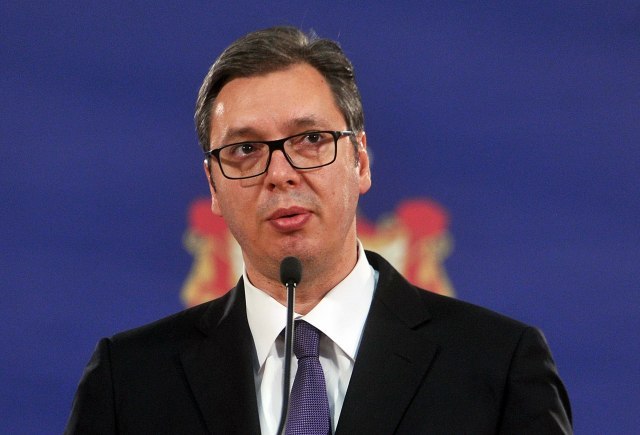 SManalysis
SManalysisTo get as much as we can, and lose the least we have to, that is what we are fighting for when it comes to Kosovo, under almost impossible conditions.
SOURCE: TANJUG WEDNESDAY, AUGUST 1, 2018 | 11:32
This is what President Aleksandar Vucic said on Wednesday, adding that he "believes we will not get less than what Serbia had been offered."
In an interview with Pink TV, Vucic pointed out that, while at it, "we are not fighting against the Albanians, but against many Western countries who are behind Kosovo's independence, including the United Kingdom."
"Look what Britain is doing via its agent outposts in central Serbia, in Kosovo, in the north of Macedonia," he observed.
Vucic reminded of the sequence of events that had led to Kosovo's independence, including all the moves behind which stood Western countries - the promoters of Kosovo's independence - but also of the fact that the former authorities did not respond to these events, and of how much - even when they did react, mostly with statements - they were "without any plan and ideas, reacting in accordance with internal daily political needs."
Vucic noted "the great nervousness" in the West, in Pristina, but also in Belgrade, where, he said "some people expected a complete collapse of the Kosovo and Metohija policy."
"When those from the (opposition) Alliance for Serbia are asked why, as members of the former government, they put up a border at Jarinje and Brnjak (administrative line checkpoints between northern Kosovo and central Serbia), there are no Albanians there - there is no answer," the president said.
"Everything we get, therefore, will be something, because we don't have anything," he said.
"We have many opponents in the West," Vucic continued. "You saw what the British did and what they are doing, as well as some others through their agent outposts in the Balkans. We are struggling under difficult, almost impossible conditions to get the most out of what we can for our people, and to lose less," he said.
Vucic then explained "the genesis of the Kosovo and Metohija problem" recalling that Serbia in 1999 went to war for Kosovo against 19 of the world's most powerful countries (NATO members), "and through no blame of its own."
"Those 19 countries trampled on all legal principles and norms. I am not one of those ingratiating myself and saying that only (then president) Slobodan Milosevic was to blame. He did not calculate well and did not understand where that conflict was leading us. He is guilty because he should have fought to have good airplanes and tanks. But, he is not guilty of aggression, instead those who carried it out are. As a result of that aggression, we got the Kumanovo Agreement and (UN Security Council) Resolution 1244," he said.
Vucic added that this resolution "does not speak of Serbia, and the Albanians are mentioned more often than the Serbs."
"This document mentions the Federal Republic of Yugoslavia (made up of Serbia and Montenegro), and in 2006, thanks to the irresponsibility of those then in power - I do not want to speak about the interests of those who led Montenegro - we let those who were in favor of a common state with Serbia not to win in the (Montenegrin independence) referendum, because we were not seriously dealing with anything, since we had a cohabitation authorities that were fighting among themselves," he criticized.
Vucic said that in 2004, a pogrom against the Serbs occurred (in Kosovo), when our citizens and holy places were targeted -" while the state did not react in any way, except with press releases."
Then, in 2008 - "although international circles, who were unfair to Serbia, and who were saying 'standards before the status' all the time - switched to 'forget about standards, we'll never fulfill them, let's go for status' - and the Albanians moved to self-declare their own independence."
"To that, we react largely irresponsibly, without seriousness, or strength, without ideas, as if surprised, in accordance with internal needs, because some wanted to protect something, others to remain in power, instead of jointly standing up. That cost us a great deal," said Vucic.
He also recalled that in 2010, Serbia went before the International Court of Justice (ICJ) to ask whether the unilateral declaration of independence of Kosovo and Metohija was carried out in a legal way.
"We did not seek arbitration by experts who are not dependent on their countries, but from the ICJ where judges are representatives of their countries," he said.
Vucic then mentioned that a few days ago the anniversary was marked of the murder of 14 Serb farmers in Staro Gracko, in Kosovo, and that the Albanian press did not report about it - "but they praised (Vuk) Jeremic on the anniversary of the decision of the ICJ, and in addition, represented me as Satan."
"I am Satan and the devil - even though I have not said a single ugly word about the Albanians - just because I'm trying to, together with (Marko) Djuric and the government, pull something from the abyss for the Serb people that would not be degrading, which would save face, our people - because if the trend continues in 15 years we will not have Serbs in Kosovo and Metohija - (we're trying) to get more than what was in Ahtisaari's plan," he explained.
"In these conditions, we are trying to get as much as possible for Serbia and the Serbs, to break the viscous cycle of conflict," he said.
Vucic stressed that he was "fighting to preserve peace for our children" and that he has been doing this "for the past six years - and this is respected in the international community, but only here it isn't respected, it's taken as done deal and cowardice."
No comments:
Post a Comment